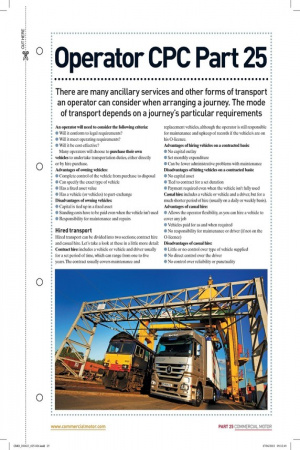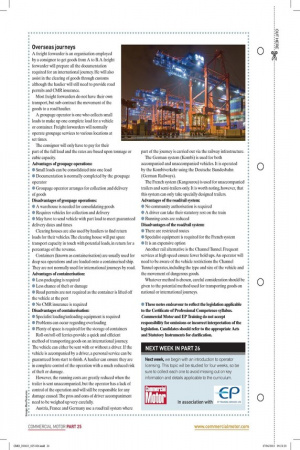Operator CPC Part 25 • • • • • •
Page 19

Page 20

If you've noticed an error in this article please click here to report it so we can fix it.
• • • • • • • • • • • • • • • • • • • • • • • • • • • • • • • • • • • • • • • • • • • • • • • • • • • • • • There are many ancillary services and other forms of transport an operator can consider when arranging a journey. The mode of transport depends on a journey's particular requirements An operator will need to consider the following criteria: • Will it conform to legal requirements?
• Will it meet operating requirements?
• Will it be cost-effective?
Many operators will choose to purchase their own vehicles to undertake transportation duties, either directly or by hire purchase.
Advantages of owning vehicles: • Complete control of the vehicle from purchase to disposal • Can specify the exact type of vehicle • Has a fixed asset value • Has a vehicle (or vehicles) to part-exchange Disadvantages of owning vehicles: • Capital is tied up in a fixed asset • Standing costs have to be paid even when the vehicle isn't used • Responsibility for maintenance and repairs Hired transport Hired transport can be divided into two sections; contract hire and casual hire. Let's take a look at these in a little more detail: Contract hire: includes a vehicle or vehicle and driver usually for a set period of time, which can range from one to five years. The contract usually covers maintenance and replacement vehicles, although the operator is still responsible for maintenance and upkeep of records if the vehicle/s are on his 0-licence.
Advantages of hiring vehicles on a contracted basis: • No capital outlay • Set monthly expenditure • Can be fewer administrative problems with maintenance Disadvantages of hiring vehicles on a contracted basis: • No capital asset • Tied to contract for a set duration • Payment required even when the vehicle isn't fully used Casual hire: includes a vehicle or vehicle and a driver, but for a much shorter period of hire (usually on a daily or weekly basis). Advantages of casual hire: • Allows the operator flexibility, as you can hire a vehicle to cover any job • Vehicles paid for as and when required • No responsibility for maintenance or driver (if not on the 0-licence) Disadvantages of casual hire: • Little or no control over type of vehicle supplied • No direct control over the driver • No control over reliability or punctuality Overseas journeys A freight forwarder is an organisation employed by a consignor to get goods from A to B. A freight forwarder will prepare all the documentation required for an international journey. He will also assist in the clearing of goods through customs although the haulier will still need to provide road permits and CMR insurance.
Most freight forwarders do not have their own transport, but sub-contract the movement of the goods to a road haulier.
A groupage operator is one who collects small loads to make up one complete load for a vehicle or container. Freight forwarders will normally operate groupage services to various locations at set times.
The consignor will only have to pay for their part of the full load and the rates are based upon tonnage or cubic capacity.
Advantages of groupage operations: • Small loads can be consolidated into one load • Documentation is normally completed by the groupage operator • Groupage operator arranges for collection and delivery of goods Disadvantages of groupage operations: • A warehouse is needed for consolidating goods • Requires vehicles for collection and delivery • May have to send vehicle with part load to meet guaranteed delivery dates and times Clearing houses are also used by hauliers to find return loads for their vehicles. The clearing house will put spare transport capacity in touch with potential loads, in return for a percentage of the revenue.
Containers (known as containerisation) are usually used for deep sea operations and are loaded onto a containerised ship. They are not normally used for international journeys by road. Advantages of containerisation: • Less packaging is required • Less chance of theft or damage • Road permits are not required as the container is lifted off the vehicle at the port • No CMR insurance is required Disadvantages of containerisation: • Specialist loading/unloading equipment is required • Problems can occur regarding overloading • Plenty of space is required for the storage of containers Roll-on/roll-off ferries provide a quick and efficient method of transporting goods on an international journey. The vehicle can either be sent with or without a driver. If the vehicle is accompanied by a driver, a personal service can be guaranteed from start to finish. A haulier can ensure they are in complete control of the operation with a much reduced risk of theft or damage.
However, the running costs are greatly reduced when the trailer is sent unaccompanied, but the operator has a lack of control of the operation and will still be responsible for any damage caused. The pros and cons of driver accompaniment need to be weighed up very carefully.
Austria, France and Germany use a road/rail system where part of the journey is carried out via the railway infrastructure.
The German system (Kombi) is used for both accompanied and unaccompanied vehicles. It is operated by the Kombiverkehr using the Deutsche Bundesbahn (German Railways).
The French system (Kangourou) is used for unaccompanied trailers and semi-trailers only. It is worth noting, however, that this system can only take specially designed trailers. Advantages of the road/rail system: • No community authorisation is required • A driver can take their statutory rest on the train • Running costs are reduced Disadvantages of the road/rail system: • There are restricted routes • Specialist equipment is required for the French system • It is an expensive option Another rail alternative is the Channel Tunnel. Frequent services at high speed ensure fewer hold ups. An operator will need to be aware of the vehicle restrictions the Channel Tunnel operates, including the type and size of the vehicle and the movement of dangerous goods.
Whatever method is chosen, careful consideration should be given to the potential method used for transporting goods on national or international journeys.
• These notes endeavour to reflect the legislation applicable to the Certificate of Professional Competence syllabus. Commercial Motor and EP Training do not accept responsibility for omissions or incorrect interpretation of the legislation. Candidates should refer to the appropriate Acts and Statutory Instruments for clarification.









































